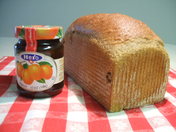
The question is can I vary the amount of yeast in a recipe to quicken or slow down how my dough rises to fit my schedule?
The short answer is yes, but there maybe other factors that will effect the dough's rising time. Whether you bake often, and the temperature of your kitchen will also play a role in how quickly the dough rises.
The amount of yeast you use in your bread dough has a bearing on how quickly the dough will rise. By reducing the yeast, the dough will take longer to raise and will also produce a stronger dough.
The more yeast in a recipe, the quicker it produces CO2, alcohol, and organic acids. The alcohol, being acidic, weakens the gluten in the dough. This is important because the gluten is the elastic bands in the dough that give the dough it's strength and ability to stretch. If there is too much yeast added to the dough it becomes porous and weak and won't rise; or won't rise very well. More yeast is not always better.
Another factor to consider is if you bake bread all the time your kitchen is full of wild yeast, which will make the dough rise quicker. If you seldom bake bread, your kitchen will be “sterile;” and your dough won't be aided by the wild yeast.
Adjustments in Yeast
If you're an occasional bread baker and use instant yeast, cut back the usual 2 to 2 1/2; teaspoons to 1 to 1/12 teaspoons. The amount depends on how long you want to let the dough bulk ferment before you put it into the pan for it's final shape-rise and bake process. Using 1/2 teaspoon gives you lots of flexibility, such as letting the dough “rest” for 16 to 20 hours; 1 teaspoon would be a good amount for an all-day or overnight rise (10 hours or so, at cool room temperature). Instant yeast is also more vigorous because there is more yeast per teaspoon than active dry yeast. If you're using active dry yeast, up the range to 3/4 to 1 1/2 teaspoons. Read More ...About Yeast
I have found in my kitchen, where I bake bread every day, I can cut the yeast all the way back to 1/16 to 1/8 teaspoon in a 3-cup-of-flour recipe, and get a good overnight or all-day rise.
Adjusting your yeast, temperature and baking more often affects how long it will take your dough to raise. Baking around your schedule is easy once you understand these principles.
Source:
King Author Flour
www.seriouseats.com - Bread Making 101
The short answer is yes, but there maybe other factors that will effect the dough's rising time. Whether you bake often, and the temperature of your kitchen will also play a role in how quickly the dough rises.
The amount of yeast you use in your bread dough has a bearing on how quickly the dough will rise. By reducing the yeast, the dough will take longer to raise and will also produce a stronger dough.
The more yeast in a recipe, the quicker it produces CO2, alcohol, and organic acids. The alcohol, being acidic, weakens the gluten in the dough. This is important because the gluten is the elastic bands in the dough that give the dough it's strength and ability to stretch. If there is too much yeast added to the dough it becomes porous and weak and won't rise; or won't rise very well. More yeast is not always better.
Another factor to consider is if you bake bread all the time your kitchen is full of wild yeast, which will make the dough rise quicker. If you seldom bake bread, your kitchen will be “sterile;” and your dough won't be aided by the wild yeast.
Adjustments in Yeast
If you're an occasional bread baker and use instant yeast, cut back the usual 2 to 2 1/2; teaspoons to 1 to 1/12 teaspoons. The amount depends on how long you want to let the dough bulk ferment before you put it into the pan for it's final shape-rise and bake process. Using 1/2 teaspoon gives you lots of flexibility, such as letting the dough “rest” for 16 to 20 hours; 1 teaspoon would be a good amount for an all-day or overnight rise (10 hours or so, at cool room temperature). Instant yeast is also more vigorous because there is more yeast per teaspoon than active dry yeast. If you're using active dry yeast, up the range to 3/4 to 1 1/2 teaspoons. Read More ...About Yeast
I have found in my kitchen, where I bake bread every day, I can cut the yeast all the way back to 1/16 to 1/8 teaspoon in a 3-cup-of-flour recipe, and get a good overnight or all-day rise.
Adjusting your yeast, temperature and baking more often affects how long it will take your dough to raise. Baking around your schedule is easy once you understand these principles.
Source:
King Author Flour
www.seriouseats.com - Bread Making 101
 RSS Feed
RSS Feed
